








Banks that have Automated Teller Machines (ATMs) mounted at the Kotoka International Airport (KIA) are expected to pay US$10,000 as charges for rental per square meter for a year, Minister of Transport, Kwaku Ofori Asiamah, has disclosed.

The cost of rent banks pay operating ATM at Terminal 3 is the highest among other o ce space.
For instance, duty-free shops pay between US$500, US$520, while pharmacy shops pay US$300 per square meter annually.
Electronics shops also pay US$300, jewelry US$400, business lounges US$425, CIP

 By Eugene Davis
By Eugene Davis
Lounge US$500, medical laboratory US$500, hotel lounge (US$650).

O ces such as airlines, banks, ground handlers pay US$650 per square meter per annum.
The transport minister revealed this in Parliament on Thursday when he responded to a question from Ibrahim Murtala Muhammed, Member of Parliament (Tamale Central).
Mr. Murtala Muhammed asked how much government has generated from the private entities operating at the spaces within the Terminal 3 at the KIA from the year 2017 till date.
The transport minister responded by saying “the rate per square
meter is charged per annum., stating that the cost of rent for food and beverage such as light restaurant, heavy restaurant and pub ranges from US$280, US$290 and US$300 respectively.”
The minister added that 20 entities are currently operating in the duty-free area of Terminal 3 at KIA, stressing that the contracts were awarded by either advertising the space or upon request from individual/private entities.
According to Mr. Ofori Asiamah, the Terminal 3 became operational from September 2018. Revenues generated from September 2018 to December 2022 amounts to GHc136.5m from these private entities through royalties and rent.
Government has announced the successful settlement and conclusion on Tuesday, 21st February 2023 of its Domestic Debt Exchange Programme (DDEP) in respect of the cedi-denominated notes and bonds issued by the Government, E.S.L.A. Plc or Daakye Trust Plc.
This successful result is a signicant achievement for the Govern-
ment in the implementation of the economic strategies of the post-COVID-19 Programme for Economic Growth (PC-PEG) during this current economic crisis.
The settlement was made pursuant to the terms and conditions set forth in the 2nd Amended and Restated Exchange Memorandum dated 3rd February 2023 (the
“Exchange Memorandum”). Capitalised terms used but not de ned herein shall have the meanings ascribed thereto in the Exchange Memorandum.
On the Settlement Date, 16 Series of New Bonds were issued to Eligible Holders whose tenders were accepted by the Government. Pursuant to the Exchange Memorandum, the principal amount of
the New Bonds per holder is composed of the outstanding principal amount of Eligible Bonds tendered by such holder plus any amount of Accrued Interest Payable in respect thereof, and was allocated among holders based on each holder’s category pursuant to the Exchange Memorandum.
On the Settlement Date, such
principal amount was credited to their respective securities account at the Central Securities Depository (“CSD”) from which each holder’s Eligible Bonds were tendered.
Pursuant to the Exchange Memorandum, all tenders accepted by the Government resulted (i) in the case of the Eligible Bonds issued by the Government, in electronic
cancellation of such Eligible Bonds at the CSD on the Settlement Date, and (ii) in the case of Eligible Bonds issued by E.S.L.A. Plc and Daakye Trust Plc, in the transfer, on the Settlement Date, of such Eligible Bonds in favour of the Government who became the holder thereof.
On the Settlement Date, the Government signed the New Bond
Documentation, consisting of the new Deed of Covenant under which the New Bonds were constituted and issued (including the Terms and Conditions governing the New Bonds attached thereto) Pricing Supplement speci c to each Series of New Bonds.
According to Mrs Dapaah, recycling of used cars will be a new area for Ghana’s waste management sector, adding that it holds prospects for potential investors.
“It will be very interesting for the Jospong Group of Companies and other interested private companies to explore the possibility of investing in the recycling of used cars,” she urged.
She was also happy that the Jospong Group of Companies was forging a new relationship with a global waste management company in Thailand.
“I must say that you are with the right person and the right company (making reference to Dr Siaw Agyepong and his Jospong Group of Companies),” she told the delegation.
The Jospong Group of Companies (JGC) and other interested private companies in Ghana’s waste management space have been urged to look at the possibility of investing in recycling of used vehicles.

The Minister of Sanitation and Water Resources, Mrs Cecilia Abena Dapaah, made the call when she received a delegation from Wongpanit Pathong Compa-

ny Limited, a leading Thailand and global waste management company, at her ministry on Friday, February 24, 2023.
The meeting with the minister and the Wongpanit delegation, led by their President, Dr Somthai Wongcharden, was facilitated by the JGC.
She was very delighted that the Thailand waste management giant was into recycling of used cars and other car products including used batteries.
“We have a lot of damaged cars sitting in the police stations; a lot of used car tyres gathering mosquitoes, especially during the rainy season, and this is a very interesting area,” she said.
She praised the Jospong Group of Companies for its growth in the recycling space of waste management.
“But I am sure you [Wongpanit Pathong] are older and bigger as a company so the mutual working together will be highly pro table,” she optimistically stated.
Mrs Dapaah, therefore, appealed to both foreign and local investors
to come and invest in Ghana’s waste management space, underscoring that Ghana produces about 7 million tons of waste a year of which about 64% is organic.
She intimated that the collaboration between the government and the private sector was yielding “huge results.”
“…and I must say that we are on the right path,” she admitted.
One of such major collaborations, she said, was the construction of recycle plants in all the 16 regions of the country.
“And as I speak, we have 2 of 3 liquid waste management companies that are also ready. One has been commissioned and we have 2 more coming up,” Mrs Dapaah said.
These waste management facilities, she said, were made possible
through the government’s collaboration with the JGC.
Mrs Dapaah re-a rmed the government’s policy of collaborating with the private sector to spur the country’s growth, insisting that “without the private sector we will not succeed.”
Earlier, brie ng the minister on Wongpanit’s operations, the President of the Thai waste management company, Dr Somthai Wongcharden, said his company focuses mainly on recyclable materials, but added that “right now we are also developing through non-recyclable waste from the municipal solid waste, so we also work on land lls.”
“We collect waste from various households and then transfer them to our recycle facilities,” he said.
He pointed out that a key success factor of the company was rst to
think of the needs of the market, then “we tailor our products and services to meet the demands of the market.”
Dr Wongcharden, who spoke through an interpreter, noted further that they were into urban mining of waste, indicating that the company mines waste from the cities.
“We work as a private company but we have also connections with the government of Thailand,” he admitted.
Furthermore, the President of Wongpanit Pathong Co., Ltd., disclosed that his company also manages hazardous waste that were recyclable such as car batteries, electronic waste (e-waste) among others.
“We are also into recycling of car batteries, used car recycling. We also work with Mercedes Benz Thailand to destroy damaged
cars,” he indicated.
He revealed that Wongpanit Pathong Co., Ltd., has 2,334 branches across Thailand, adding that the company has branches in Cambodia and the United States of America and other parts of the world.
The branches in the United States, he said, were doing very well.
Later in the day the delegation toured some of the facilities of the JGC within the Greater Accra Region.
These were JA Plant Pool, Sewerage Systems Ghana Ltd., Integrated Recycling and Compost Plant (IRECoP).
The rest were Abgobgloshie Metal Scrub Dealers, Adipa Waste Management Centre and Accra Compost and Recycling Plant (ACARP).

Energy Minister, Dr Matthew Opoku Prempeh has assured that his ministry will keenly monitor every step in the Gold for Oil programme value chain from the ship that brings the oil, through delivery to the BDCs, to the OMCs and to the pumps.
This, according to Dr Opoku Prempeh will ensure that the purposes for which the programme was birthed, which are stable prices, lower prices and removing the foreign exchange conundrum are not defeated by the defects in the system.
Dr. Prempeh was speaking at the 2023 energy sector retreat at Senchi in the Eastern Region, where the Ministry of Energy and its agencies have gathered to strategise for the year.
The Minister said the programme will ensure the fuel security of the country and further charged the Bulk Oil Storage and Transportation Company (BOST) to collaborate seamlessly with the National Petroleum Authority (NPA) regulator of the downstream space to ensure robust implementation.

The Minister further bemoaned
the deliberate distortions in the media space around the policy and urged the NPA to keep updating the public on the nuances of the programme.
The Minister who is also the Member of Parliament for Manhyia South said under the programme, the Chamber of Bulk Oil Distributors will not be allowed to negotiate on behalf of the Bulk Import Distributing and
Export Companies (BIDECS) and thus said BIDECS who want to participate in the programme must apply to BOST “This programme, with stakeholders such as the Energy Ministry, Ministry of Lands and Natural Resources, Bank of Ghana, PMMC being led by the Vice President to all intents and purposes will provide the needed cushion to Ghanaians. We are taking steps to
ensure that the premiums charged by the International Oil Traders are reduced, achieving some e ciency gains”
The energy sector retreat which started on Friday 17th February will end on Monday, 20th February and is expected to further deepen e orts at ensuring reliable power supply and fuel availability for the Ghanaian people.

 By Samuel Kojo DARKO
By Samuel Kojo DARKO
A study by the World Bank has revealed that, MSMEs constitute about 90% of all jobs in Ghana, and contributes approximately 40% to the nation’s GDP. Yet, the subsector is the least recipient of nancing from the nancial institutions in the country, particularly the commercial banks.
A careful study of the balance sheets of commercial banks in 2022 indicates a noticeable contraction of loans and advances to the private sector in general, and far less to the MSME subsector in particular.
The latest Bank of Ghana MPC’s report indicates that, even though loans and advances of banks increased by 30.2% to Ghs70.00 billion in 2022, credit to the private sector in particular (including MSMEs) contracted sharply by 14.5% in real terms, compared to 1.3% contraction in 2021.
The report further states that, the increase in nominal value of banks credit portfolio was attributable to portfolio rebalancing and favorable revaluation e ect on foreign currency denominated credits, apparently due to the cedi appreciation in December 2022.
What the above information means is that, nancing to the private sector in Ghana (which is hugely dominated by the MSMEs) is progressively under threat and contracting (i.e from 1.3% to 14.5% in 2021 and 2022 respectively). Thus, the private sector (MSMEs) nancing gap is ever widening.
The MSME nancing gap in Africa is estimated at $421 billion, according to the African Development Bank (AfDB). And in Ghana, the IFC-World Bank estimates that, the MSME nancing gap stands at $6.1 billion, equivalent
to 13% of the nation’s GDP in 2017. This situation would unfortunately deteriorate in 2022 as indicated above.
Commercial banks in Ghana are in general, deemed as commercially and operationally viable nancial institutions that are better placed to nance MSMEs. They have huge stated capital, wider geographical coverage, robust IT infrastructure, sound governance practices, and above all, favorable public con dence. Yet commercial banks are the least when it comes to MSME credit portfolio as a proportion to their total assets. Several factors are cited to account for this, including, but not limited to, high default rates, poor cash ow records, little interest income for MSME loans, inter alia.
But the above conversation is not even the end of the woes of Ghanian MSMEs. The sector also receives little budget allocation from the government yearly, amid high cost of doing business, inadequate and sometimes inecient state infrastructure to support their development, limited access to market, inter alia.
The scenario looks even more bizarre in the case of MSMEs in the agriculture value chains.
The combined e ects of all these, make the MSME subsector incapable, and o -course de cient to grow. Yet, the sector deemed to be the backbone of the economy. What a weird paradox!
Traditionally and unsurprisingly, MSMEs are unable to provide collateral (such as real estate, movable assets, etc.) to obtain credit from the commercial banks. This means, cashow-based lending model would be the best available option for the banks to lend to them. But,
these MSMEs however do not keep proper cash ow records to support cash ow lending model. This means, a new specialized approach is required.
A psychometric approach-which deals with the use of structured questions to infer about the morality and the cash ow situations of the MSME borrower is one most tested approach used by most MFIs globally to disburse credit to the MSMEs. But this comes with its own challenges although. Indeed, the enormous contributions of MFIs in Ghana in limiting the MSMEs nancing gap cannot be overemphasized. However, the MFIs themselves are not without challenges. MFIs face several existential challenges, sometimes even severer than what MSMEs face. These include; liquidity, capital adequacy, pro tability and asset quality.
Others are inadequate IT infrastructure, poor governance issues, high cost of funding, high cost of operation, and unfavorable public perception. The commercial banks on the other hand, however, have solutions to all of these. And this put them in a comparatively stronger position to better serve the MSMEs.
The establishment of the new Development Bank of Ghana (DBG) is yet another good step in a right direction, seeking to mobilize long term patient funds and technical assistance for the e ective participation of commercial banks in MSME nancing space. The DBG has since signed on (4) four commercial banks in Ghana in partnership for this purpose.
To complement this, the Bank of Ghana’s other nancial institutions supervision department (OFISD), which is directly responsible for the supervision of MFIs should be strengthened in all might to be able to provide robust supervision for the MFIs. in order. This way MSMEs would receive e ective nancial solutions for growth. MSMEs deserve robust nancial institutions in order to become bigger corporations tomorrow.
But there is yet another looming nemesis! - The Ghana’s domestic debt exchange program (DDEP) and its concomitant e ects on the
fragile state of MSME nancing in the country.
Currently, the government’s treasury bill rates are in the roofs at 35.7%, in ation rate at 53.6% and policy rate at 28%. These rates have stubbornly been erratic in recent times, and would consequently feed into higher lending rates of banks and MFIs. The resultant e ect is that, MSMEs borrowings are going to be limited.
At the same time, banks and MFIs are redirecting their loanable funds to otherwise attractive government bills, leaving little for lending purposes. Again, banks that signed up unto the DDEP have their funds locked-up with the government according to the terms and conditions of the program, thereby limiting their nancing abilities to the MSMEs. In addition, the MPC report also revealed that, banks are currently experiencing heightened operational and prudential risk, due to the general fall on their key nancial soundness indicators.
These developments put the commercial banks into serious quandary, as to whether to increase their lending portfolio to the private sector MSMEs (which are deemed risky) or continue investing into attractive government bills/notes, which are now deem risky-according to some experts. These notwithstanding, commercial banks are strongly encouraged to redirect funds to the private sector, particularly the MSMEs in a bid to improve their stake in limiting nancing gap. This could be done if they adopt similar but enhanced strategies from the MFIs (including psychometric nancing). They could further deploy the use of technology in the form of alternative data harvesting for this purpose. Again, partnership with Fintechs and Agri-techs companies aiming at improving nancing to the MSMEs is yet another recommended approach. Banks are strongly advised to be measured in their oversubscription to government bills, taking lessons from the bond experience. Limiting Ghana’s MSME nancing gap will require active participations from both commercial banks and MFIs..
Despite numerous donations and debt relief, progress in sub-Saharan Africa has been poor to none.
We can only accept this new power battle between the three great power centers, or continue to connect economies, promote global cooperation, trust, and business. In the Global Chamber of Business Leaders, we will de nitely be on the side of the latter.
Being on the side of cooperation will mean being on the side of peace, and this will be especially important in the future.
This will lead to more instability in the world, especially in the underdeveloped part. As the US, EU and China are closing, there will be less and less room for the spread of economic progress, knowledge and technology to the rest of the world.
The process of outsourcing production has reduced economic di erences between countries and global inequality for decades. A new world, a new world order is emerging. A departure, in short, from everything that is well known to us.
A period of crisis is coming for Europe, the USA, China, and the rest of the developed world. A period of famine is coming for Africa. Most of the success in the global ght against poverty in recent decades has been achieved due to the economic progress of China and India.
HH: What opportunities do you see in 2023 for businesses and entrepreneurs?
It's hard to see into the future. No one has a crystal ball to predict the future. In any case, global connectivity would generate trade volume as well as keep investment levels at a level that would ensure global economic growth and thus much-needed optimism. Instead, as we can see, an era of isolationism is coming.
HH: What is your de nition of power?
I could laughingly reply that nature knows the best answer to
this question, because nature has the greatest and ultimate power in this world.
In the world of business and the leaders, the greatest power is certainly what we call charisma; self-con dence, which should not be exaggerated, narcissistic, then broad knowledge, rich experience, and nally strong smooth communication. Everything else is just a consequence.
HH: How do you think power dynamics are changing in the global landscape?
The geopolitical map of the world is changing. After several decades of greater connection and cooperation comes the time of growth of isolationism and protectionism. Every part of the world strives to become self-su cient and less dependent on others.
Let me say that I am extremely proud of my colleagues and colleagues in the Global Chamber of Business Leaders. I am especially proud of the cooperation between them and the relationship that has become like watching a dispersed family living around the world. I have never encountered such belonging and desire to be part of something that will be a change for a better tomorrow in my life.
Leading such an organization is perhaps the most beautiful and best thing that can happen to you in your life. Especially since you are surrounded by such special people.
HH: What strategies do you recommend for creating sustainable success in today's economy?
As I said before, I myself am a big supporter of global economic cooperation and further integration, not protectionism and isolationism.
We see that in ation, for example, is becoming a growing global problem and that the world is sliding towards recession.
It's just a waste of time when the world will nd itself there, in
recession. Perhaps the key to this will be the latest OPEC+ decision, taken a few days ago. Now we would need more cooperation, not less.
Personally, I am a supporter of development strategies that are based on the principle of sustainability performance and include solutions for nature, the economy, and society, i.e. people.
If ever, it is especially important right now that strategies include sustainable initiatives that we can sovereignly support with our core capabilities, for example, knowledge, know-how, technologies, or anything else we are good at. It is necessary to create strategies in such a way as to achieve the highest possible social impact. We also need to understand the micro and macro environment in which we operate.
Both people and the economy now urgently need some new optimism, and the world needs integration and cooperation. We all seem to be watching helplessly as the world changes before our eyes.
For those who know how to see opportunities, crises never exist.
Opportunities must be sought in niches, perhaps in the modus operandi of a changing world.
Certainly, in the segments that deal with the problems of logistics, climate change, IT technology, arti cial intelligence, microchips, etc.
HH: What do you think are the biggest challenges facing businesses today?
The biggest problem is de nitely disruptions in supply chains that cause shortages, be it microchips, spare parts, raw materials, or energy sources, and even food.
In many cases, there are no insurmountable obstacles behind these disturbances, but only speculative purchases.
Speculation drives in ation, causes constant price increases, major market disruptions, and diminishes people's purchasing power. Most of those with the lowest incomes.
The time period in which we live now is therefore certainly one of the most unpredictable and complex time periods of our lifetime for most entrepreneurs.
HH: What does it take to build a powerful global organization today?
You cannot build a strong organization, the strength of the organization is always in the people who are part of the organization. In fact, people are an organization. The stronger the people, the stronger their experience, knowledge, and the more interconnected they are, the greater the strength of the organization. And we must be able to anticipate those factors that make it necessary to consolidate strategies again and again and adapt them to necessary changes.
The ability to make quick decisions is more important today than ever before.
HH: What is your advice for maintaining well-being in a fast-paced and ever-changing world?
Giving from the heart, loving and being loved is probably the best advice for well-being during this turbulent time. And doing whatever relaxes someone, whatever that is. To live as everyone wants and as it makes them happy, even if it means moving away from some social patterns and norms. To seek and nd inner peace, and to be truly happy, also means to live a truly full life, and that is the greatest thing, true nirvana.
HH: How do you personally maintain well-being and inner balance on a daily basis?
I have very little free time and when I do, I try to relax as much as possible. I really enjoy the moments with rare but good and true friends.
I also like a good read, I enjoy watching shows about nature,
especially fauna. I like good music and sometimes I just lie down and listen to music.
Of course, all of the above only happens when I'm not working, but I work every day. Sometimes up to 20 hours a day. Many people warn me that I will burn out because of workaholism, but I am happy to tell them that when a person does what he would do even if he had to do it for free, he cannot burn out.
HH: What do you see as the key trends a ecting business in the years ahead?

Depending on the sociological development of society, trends will also develop in the future.
At this point, it would be hard for me to predict future trends, let alone for years to come. For example, in 2020, when powerful social changes began, the trends were completely di erent, even diametrically opposed to what they were just a year later. Years of change and adjustment are coming, I would say. I hope for years of solidarity, understanding and
cooperation. If so, we will be generational winners, otherwise...we'll see.
HH: What do you think are the biggest challenges and opportunities facing the global economy in 2023?
The greatest opportunities always come from the greatest challenges.
And the challenges are what will most likely be lled with the year 2023 as well. The world economy will almost face a recession and we can only hope that there will be no outbreaks of new major con icts around the world.

We must strive hard for this, but at the same time we must do everything to bring peace to Ukraine. There is an urgent need to bring the leaders involved in this war to the negotiating table. Urgent and immediately.
The year 2023 will therefore probably be a very unpredictable year economically.
Macroeconomists predict that at
least until the middle of 2023, in ation around the world will continue to grow. I personally think that it will be a success if we manage to tame in ation at least until the end of 2023.
I don't even see an end to the current logistical problems. The deindustrialization of Europe is predicted. In short, the predictions for 2023 are by no means rosy.
Changes are not necessarily bad, especially if we know how to anticipate them and look for opportunities in them.
I personally believe that the coming years will not only be years of great challenges, but also years of great opportunities.
We don't have any major reasons to be pessimistic, so let's be optimistic and everything will be ne.
HH: What advice would you give to aspiring business leaders looking to achieve success in the years
ahead?
I would advise them to live with their eyes open and their ears on the alert.
In this way, they will be able to see every opportunity and hear everything that can lead them to an opportunity for success.
I would advise those who are just about to embark on the entrepreneurial journey to always be aware of the deviance of greed and to never be greedy.
I know, it's hard not to be greedy in this world of greed and sel shness, but still. Greed will eventually destroy any good opportunity and send them back to square one. Instead of the desire for quick success and money, they should rather listen to their heart and intuition, and to all those who have already walked the path they are now walking. They should never be faced with a dilemma: Heart or money.
The rating on Ghana’s local-currency debt was upgraded by S&P Global Ratings as the country settles its domestic debt exchange with bondholders. The nation’s foreign debt remains rated in default.
Ghana’s local credit score was raised to CCC+ from SD — or selective default — by S&P after new domestic debt securities were delivered to creditors, according to a Friday statement.
The credit assessor continues to score the West African nation’s foreign-currency debt at SD as the
government works to restructure the external bonds, wrote analysts Frank Gill and Ravi Bhatia.
“We understand that the authorities aim to lower debt to GDP to about 55% over a ve-year horizon,” they wrote. “Discussions with holders of foreign currency instruments are continuing.”
Ghana has been engaging investors since late last year to restructure about $30 billion of its $46 billion in local and international debt. It recently completed the rst part of a domestic restruc-
turing, with investors exchanging 83 billion cedis ($6.7 billion), or 64% of holdings, for new securities, against an overall target of 80%.
It aims to start “substantive” discussions with international bondholders and their advisers in coming weeks, Minister of Finance Ken Ofori-Atta said Thursday.

Still, the ongoing discussion mean payments have been halted on individual bond. S&P on Friday lowered the ratings on three UK-law eurobonds — matur-
ing in 2023, 2027 and 2025 — to D, or default.
On Friday, a panel of dealers and investors agreed to review whether a missed payment of a coupon on one of a dollar bond due 2026 constituted a so-called credit event, which may trigger the payout of insurance protection on the debt.
Fitch Ratings last week cut Ghana’s local-currency credit score to default. It also downgraded its foreign-currency debt rating to partial default after it missed eurobond payment.Bloomberg
Ghanaians must commend themselves for sustaining their democracy for 30 solid years. We should not underestimate this success we have so far chalked.
Many countries on our African continent have not been able to
nurture their democratic culture to the stage or the number of years we have reached.
There are many despots on the continent who are not democratic and are not ready to make the process or the culture thrives.
Ghana,since 1992 when we accepted democracy as a way of governance system, we have not looked back.
We have elected our leaders both the executive and legislature through the ballot box for 30
years.
We have an independent Judiciary, very vibrant media,vibrant civil society organization,numerous tink- tanks, and all the essential ingredients of Democracy freely doing their jobs.
Our nation is a secular one where the 1992 Constitution is the Supreme law and no law supersedes it.
We have to thank God for giving us the power and the democratic thoughts to be choosing our Presidents from late President Rawlings to the current sitting President Nana Akufo Addo in democratic ways.
Presidents Kufour, late Prof Mills and Mahama must be applauded for adhering to the tenets of the Constitution.They served and left o ce without making any attempt to thwart the Constitution.
They served their people to the best of their abilities.
They were not perfect as they were and are humans.
Our nation is too partisan and at times with sickening media in some aspects, but it is better than militia or military regimes and despotic governments we see around us.
It is therefore disheartening when some citizens are clamouring for military takeovers maybe because of some infractions in our democracy.
We should never consider such nefarious governments or regimes.
We have seen them before and nobody will celebrate their style of governance.
The disadvantages of such governments are countless.
Today those who called for the overthrow of their civilian regimes in some of our sister countries are now being incarcerated in their various countries prisons without being given the
right to legal process or representation.
They have regretted and are calling for the restoration of Democracy in their countries.
Democracy has its own constraints but the alternative is not military regimes.
Ghana is blessed with the power of understanding to appreciate the relevance of Democracy, rule of law and constitutionalism.
There are processes of removing or changing our leaders if they go contrary to the Constitution of the Republic but the option is not in an unconstitutional way.
As we celebrate this 30 years of our democratic milestone, the Parliament of Ghana should be celebrated as well.Parliament as the citadel of democracy, is the forum where the population is represented.
Our representatives or Members of Parliament are our legislators and watchers of the the actions and inactions of the Executive.
They ensure that the Executive manages the a airs of the population as the law recommends.
They also ensure that the Executive manages the nation's purse very well and serve the people according to the dictates of the law.
The current 8th Parliament of the 4th is the most unique House or Parliament.
Almost an equal number of seats, leading member of the opposition won the seat of the Speaker, an almost rejected member is now the 2nd Deputy Speaker and the
most powerful MP and having a member who has been barred by the Supreme Court of the land from holding himself as a member of the House until the Court decides an application brought against his quali cation as a citizen.
He has a criminal and a civil cases hanging around his neck. Also for the rst time, most majority members of the ruling party are calling on their own Finance Minister to resign else they would not do business with him.
Another excellent Parliament was the 2nd Parliament of the 4th Republic(1997).It was a Parliament that produced political and legal colossus such as Hon JHMensah, Hon Nana Akufo Addo, Kwamena Bartels, Ki Konadu Apraku, Papa Owusu Ankomah, Gladys Asmah, Theresa Ameley Tagoe, Hawa Yakubu, Osafo Marfo, Richard Anane, Yaw Barmah, John Achiwulor, SK Boafo, Lawyer Aidoo, Nana Akomea on the side of the New Patriotic Party(Minority).

On the Majority side we had Alban
Bagbin, Doe Adjaho, John Asiefu Nketiah, JH Owusu Acheampong, Ama Benyiwa Doe, John Mahama etc.
So far so good in our democratic culture.We have not attained perfection but we have gone beyond a good grade.
All hands must be on deck to keep, defend,protect and sustain this culture of Democracy and the Constitution of the Republic.
Ghana is not as bad as some naysayers are trying to portray. Yes,challenges we have in many areas such as corruption, mismanagement, economic downturn, sanitation and others, but we can still overcome them.
Democracy allows us to criticise our leaders and others, but it must be done within the remit of our laws.
We should halt using any unprintable words against our country, no matter the degree of anger or annoyance.
Congrats to all who contributed and still contribute to the growth of our democratic culture.
Industrial policy has returned to government agendas across the developed and developing world. While the US In ation Reduction Act has shocked America’s Asian and European trading partners, the Biden administration’s signature climate-change legislation is just the latest in a series of recent policies that seemingly y in the face of World Trade Organization rules.
At a time of growing economic and political uncertainty, it is hardly surprising that govern-
ments are increasingly embracing industrial policy. Massive government intervention, after all, underpinned East Asia’s “economic miracle” between the 1960s and 1990s. Political scientist Chalmers Johnson attributed Japan’s postwar economic boom to the Ministry of International Trade and Industry, which dominated Japanese policymaking from 1949 to 2000. Similarly, economist Alice Amsden argued that South Korea’s transformation into an economic powerhouse
relied on subsidies and tari s that encouraged the formation of giant, state-backed industrial conglomerates.
Despite the contributions of industrial policy to the East Asian growth miracle, the rise of neoliberal economics in the West made it taboo there. That began to change in 2008, however, as the global nancial crisis created a seemingly insatiable appetite for government intervention. Faced with a rapidly growing China and a looming climate catastrophe,
economist Mariana Mazzucato and others have reimagined industrial policy as a way to achieve a mission-oriented innovation economy guided by an entrepreneurial state.
But industrial policy’s fall from grace in recent decades re ected its own shortcomings, not just a rightward ideological shift. Japan’s failed e orts to promote domestic aircraft production in the 1970s, for example, showed that governments are not always good at picking winners. For
today’s industrial policies to be e ective, governments must learn from the past and avoid two common mistakes.

The rst is shielding domestic companies from market discipline. Malaysia’s failed e ort to build an internationally competitive automotive industry around the national car company Proton is a cautionary tale. In the 1980s, Proton gained a monopoly in the Malaysian car market thanks to various subsidies and tax bene ts. But because government support insulated the company from market discipline, it never managed to meet the quality standards needed to become a global brand. Another mistake is overreliance on foreign ownership. Thailand and South Africa used nancial incentives to lure foreign car producers to work with local manufacturers. But while their automotive industries have been more successful than Malaysia’s, they are also limited to producing lower value-added components; the higher value-added activities, such as research and development or the production of engines and transmissions, remain in foreign companies’ home countries.
China’s thriving car industry underscores the importance of nurturing local entrants. In the 1980s and 1990s, the Chinese automotive sector relied on technology transfers via foreign-owned joint ventures like Shanghai-Volkswagen. But after that strategy failed to produce the desired outcomes, the Chinese

government pivoted to investing heavily in domestic manufacturers such as Chery, Geely, and BYD, enabling them to emerge as global players.
By combining nancial incentives with market discipline and local ownership, policymakers can ensure that the industries they want to promote are competitive.
The evolution of South Korean car manufacturer Hyundai is a case in point. In the 1970s, Hyundai’s domestic lead was protected by high tari s. But when the company exported its Pony model to North America, the car became notorious for failing to meet even basic quality and emissions standards and could not compete with comparable French and German models. This failure, together with robust domestic pro ts, encouraged Hyundai to invest in R&D and eventually expand global production. South Korea’s industrial policy soon shifted from protectionism and nancial incentives toward public-private joint R&D, enabling local producers to gain the technical knowhow needed to expand into high-end products.
Mobilizing private-sector participation from the beginning and creating viable markets are crucial to industrial policies’ success. In 2008, for example, the South African company Optimal Energy unveiled an electric vehicle called Joule that was funded almost entirely by government investments. The ve-seat car was well-received at that year’s Paris Auto Show and won the Best on
Display award at the Geneva Motor Show in 2010. But local manufacturers deemed it too expensive to commercialize, given the small size of the electric vehicle market at the time and the steep cost of producing it at scale, and the project was abandoned in 2012.
Vietnam and Turkey o er two other models of encouraging EV production. Vietnamese car manufacturer VinFast, for example, abandoned gasoline-fueled cars last year to focus on EVs. It reportedly sold 23,000 cars in 2022, with sales undoubtedly boosted by government tax credits to buyers. VinFast, a subsidiary of Vietnam’s largest business conglomerate, Vingroup, is reportedly planning to enter the US market by building a $2 billion factory in North Carolina. Turkey, where the Automobile Joint Venture Group (TOGG)
recently launched the rst locally-made EV, o ers another interesting case. TOGG, established in 2018 as a joint venture to develop a viable domestic car industry, is planning to produce 18,000 cars this year and up to 175,000 vehicles annually within the next ve years. Turkish President Recep Tayyip Erdoğan, who is up for re-election in May, is reportedly heavily invested in the project, which he touts as the “people’s car.”
Given the urgency and scale of the challenges posed by climate change, the next decade will likely be characterized by increased state intervention in the economy. But policymakers must remember that successful industrial policies are not about picking winners. They are about picking good students and providing them what they need to grow and prosper.










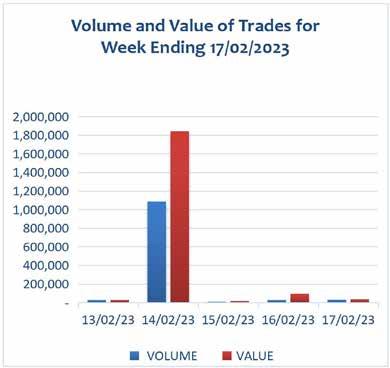
J anua r y 20,202 3


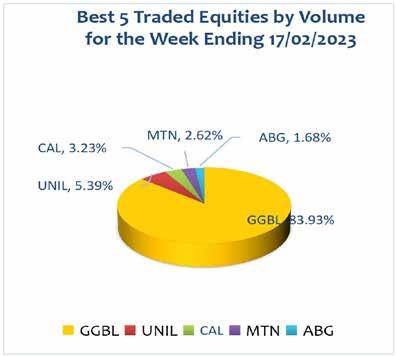




February 17, 2023

J anua r y 20,202 3 February 17, 2023
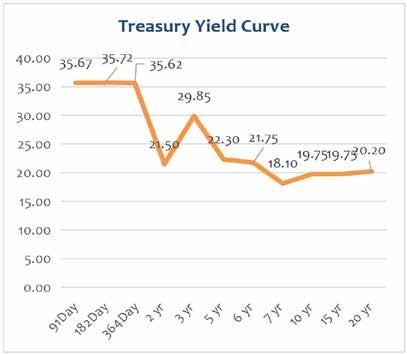
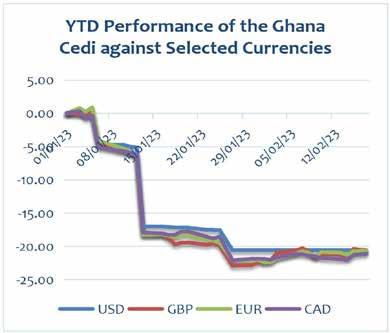





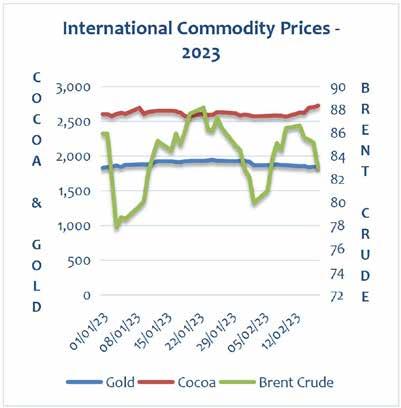
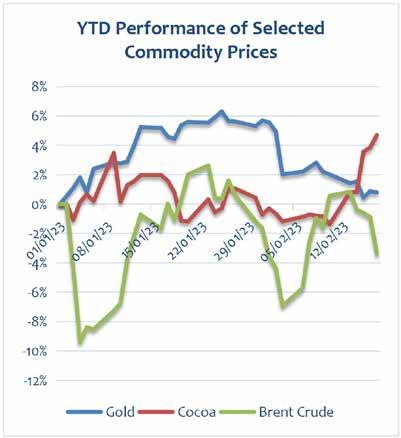
Our planet’s tightly woven, interconnected natural systems are vital to life and livelihoods. Yet with each passing season, we are witnessing the crushing realities of the climate crisis and biodiversity loss. In its 2023 Global Risks Report, the World Economic Forum warns that six of the top ten risks in the coming decade will stem directly from the loss and degradation of nature. In the face of extreme storms and oods, devastating droughts and wildres, ocean dead zones, and food scarcity, demands for systemic change have reached a crescendo. Unless we embark on a new course, our crises will only deepen.
Despite the challenge of reaching global agreements in such a fractured world, we have cause for optimism. In late 2022, the United Nations Convention on Biological Diversity (CBD) achieved a breakthrough after languishing in relative obscurity for many years.
At the COP15 summit in Montreal in December, countries completed four years of negotiations and approved the Kunming-Montreal Global Biodiversity Framework (GBF), the most signi cant intergovernmental agreement on biodiversity in over a decade.

Under the GBF, governments have committed to protect 30% of the world’s land, freshwater, and ocean by 2030; improve the sustainability of agriculture, aquaculture, sheries, and forestry; and restore 30% of degraded ecosystems. The framework establishes multiple pathways for scaling up solutions within and across borders. It includes down payments, nancial commitments, and an implementation plan, and it is already spurring action by corporations, governments, and civil society.

But critical work remains to done. On February 20, UN member states gathered in New York to nalize a key piece of the ocean-governance puzzle: a new treaty to conserve and sustainably manage marine biodiversity in the high seas.
The high seas cover two-thirds of all ocean and almost half the planet, and are home to up to ten million species – many of them still unidenti ed. But much of this biodiversity remains out of sight and thus out of mind. As a result, life in this vast expanse is constantly threatened by weak regulation of activities such as shipping and shing, and by poor enforcement of existing laws.
The high seas belong both to everyone and to no one. As with many common resources, there is no comprehensive, agreed-upon framework governing conservation and the sustainable use of the ocean outside of national jurisdictions. But since the same large petrels, leatherback turtles, sharks, and whales that we seek to protect on and o our shores spend much of their lives in the high seas, there is an obvious need for more robust global strategies to protect, manage, and monitor these areas.
Marine life does not recognize legal jurisdictions. For the conservation of migratory species and transboundary ecosystems to be e ective, we urgently need a global high-seas treaty, which in turn will contribute to the implementation of the CBD’s ambitious new framework. Without it, the CBD will have much less chance of success. That is because, currently, there are no global powers to establish marine protected areas in the high seas. Even though the UN Convention on the Law of the
Sea obligates states to assess the impact of activities in their waters, there is no global mechanism for assessing activities in the high seas. Instead, there is a patchwork of assessment mechanisms for di erent bodies that regulate parts of the high seas, but no minimum standards that ensure quality or consistency. So, what needs to happen at the summit in New York? For a new high-seas treaty to make a di erence, it must achieve multiple objectives. The rst is to provide countries with the legal powers to establish and manage a representative network of marine protected areas in the high seas, as this is essential to protecting at least 30% of the ocean by 2030. Moreover, we must dramatically strengthen governance of human activities that a ect the high seas, by establishing robust, modern environmental assessment and management standards. And we need to ensure su cient nancial, scienti c, and technical support for states that require it. We will also need a mechanism for sharing the bene ts of marine genetic resources fairly and equitably, as well as a voting procedure
when all good-faith e orts to reach consensus have been exhausted. Otherwise, one or two countries will be able to block progress even on issues that are supported by the overwhelming majority.

Only through a strong high-seas treaty and bolder action within existing treaty bodies (especially sheries-management agreements) can we protect the health of the ocean. We must adapt quickly to new activities like deep-sea mining, as well as to increased shipping collisions with large animals and rising waste, noise, and arti cial-light pollution. This requires managing the whole ocean in a more comprehensive fashion. With ocean health declining, maintaining the status quo is not a viable option.
The negotiations for the rst international ocean treaty in over 40 years, and the rst to target the conservation and sustainable use of marine life in the high seas, o er another opportunity to rebalance our relationship with nature. Building on the momentum from COP15 in Montreal, we must now set a course to address the biggest risks facing our planet in the next decade.